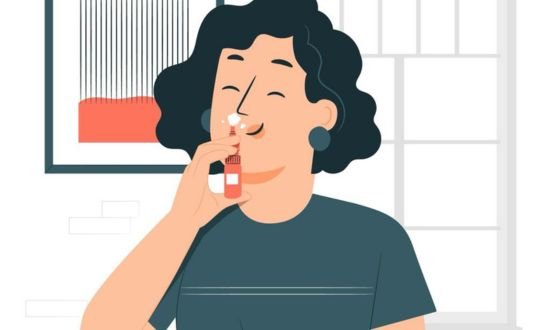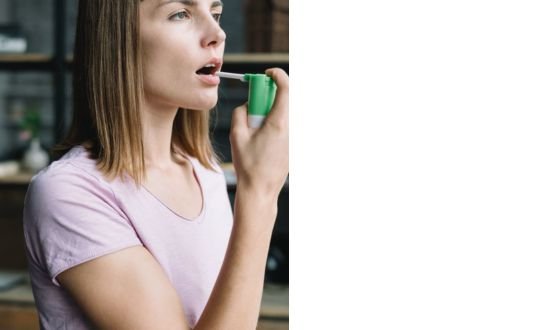Anxiety is a mental health condition that millions of people experience worldwide. Anxiety is not just a feeling of worry or stress. It can be that uneasy feeling you get before a big presentation or a racing mind that keeps you up at night, or the feeling of unease you have in social situations are all examples of this. With growing number of individuals affected with this condition people have been looking for new solutions to reduce its symptoms. Inhaler for anxiety treatment is one such breakthrough in treatment of anxiety. In this article, we’ll briefly discuss anxiety, its various conventional and non-conventional therapies and will discuss in detail the function of inhaler for anxiety treatment.
Table of Contents
Statistics about Anxiety
To appreciate the scope of anxiety, let’s look at some numbers. According to Anxiety and Depression Association of America (ADAA) over 40 million adults are affected by this condition. Globally, anxiety is the most prevalent mental health disorder which affects more than 260 million people.
Symptoms of Anxiety
Common symptoms of anxiety are:
- Racing heart
- Sweating
- Trembling
- Restlessness
- A sense of impending doom
- Excessive worrying
- Irritability
- Trouble concentrating
- Sleep disturbances
Traditional Approaches to Anxiety Treatment
Psychotherapy, medication, and lifestyle changes are frequently used in the management of anxiety. Efficacy of these approaches vary from person to person.

1. Psychotherapy
Talk therapy and cognitive-behavioral therapy (CBT) are the two basic types of psychotherapy. Working on one’s cognitive patterns and coping mechanisms can help people understand and manage their anxiety. However, psychotherapy is a costly and time consuming method of treatment.
2. Medications
Medications like selective serotonin reuptake inhibitors (SSRIs) and benzodiazepines are commonly prescribed for anxiety. They can provide relief, but they have their potential side effects as well as risk of dependency.
3. Lifestyle Changes
Lifestyle modifications like regular exercise, balanced diet and stress management techniques are very helpful in reducing anxiety. But these changes often take time to show significant results.
The Emergence of Inhalers for Anxiety Treatment
Now, let us discuss a relatively new approach to managing anxiety: anti-anxiety inhalers or inhalers for anxiety treatment. These innovative devices are designed to deliver a combination of natural compounds and aromatherapy directly to your respiratory system.
Components of Anti-Anxiety Inhalers
Anti-anxiety inhalers typically contain a mixture of essential oils and herbal extracts known for their anxiety-relieving properties. Common ingredients include in these inhalers are:
- Lavender
- Chamomile
- Bergamot
- Valerian root
Mechanism of Action of Nasal Inhaler for Anxiety Treatment
When you inhale through the inhaler, you allow the soothing aroma to reach your olfactory system. This system is closely linked to the brain’s limbic system. Limbic system plays an important role in regulating emotions and stress responses in the body. When these calming scents reach the limbic system, they can have an almost immediate effect in reducing anxiety and promoting relaxation. Specific action of various type of inhalers available in market are:

- Aromatherapy Inhalers
Aromatherapy inhalers mainly acts through power of scent. Inhaling specific essential oils triggers a relaxation response through your olfactory system. Stimulation of your senses through this mechanism can help in calming your mind and body.
- Herbal Extract Inhalers
Herbal extract inhalers utilize the soothing properties of herbs like valerian root. These herbs can affect neurotransmitters in the brain which can result in promoting relaxation and reducing anxiety symptoms.
- Cannabidiol (CBD) Inhalers
CBD inhalers has their effect through endocannabinoid system of the body. This system plays a role in regulating mood and stress. By targeting this system, CBD can help in treating anxiety. The Food and Drug administration (FDA) has not approved CBD inhalers for anxiety treatment yet but several studies have shown that they have anxiolytic properties.

- Combination Inhalers
Some inhalers combine various ingredients to provide a more comprehensive approach for treatment of anxiety. These type of inhalers often target multiple pathways in the body to promote calmness.
Pros and Cons of Nasal Anti-Anxiety Inhalers
| Type of Inhaler | Pros | Cons |
| Aromatherapy Inhalers | – Non-invasive – Easy to use and carry – Customizable scents | – Effectiveness varies – Scent preferences differ |
| Herbal Extract Inhalers | – Natural ingredients – Target neurotransmitters – Non-addictive | – May take time to show effects – Potential allergies |
| CBD Inhalers | – Interacts with endocannabinoid system – Promotes relaxation | – Legal restrictions in some areas – Potential side effects |
| Combination Inhalers | – Comprehensive approach – Target multiple pathways | – Complex ingredient lists – Variability in effectiveness |
Mechanism of Action of Oral Route Anti-Anxiety Inhalers

Oral route inhalers are made to be used orally in comparison with the conventional nasal inhalers, which need to be inhaled through the nose. The substance is immediately absorbed through the oral mucosa and into your bloodstream through lungs when you spray or inhale it into your mouth.
Pros of Oral Route Anti-Anxiety Inhalers
- Rapid relief due to quick oral absorption.
- Precise dosage control for effective anxiety management.
- Portability and convenience for on-the-go use.
- Non-invasive and gentle option for anxiety relief.
Cons of Oral Route Anti-Anxiety Inhalers
- Taste and sensation during use may not be pleasant for some individuals.
- Effectiveness of inhaler varies from person to person.
- Potential for allergies or sensitivities to inhaler compounds.
- Consultation with a healthcare professional is essential before use.
Comparison of Oral and Nasal Inhaler for Anxiety Treatment
| Aspect | Oral Route Inhalers | Nasal Route Inhalers |
| Mode of Absorption | Rapid absorption through the oral mucosa. | Absorption through the nasal mucosa. |
| Speed of Action | Almost immediate relief from anxiety symptoms. | Quick action, but slightly slower than oral. |
| Dosage Control | Precise dosage control for accurate administration. | Dosage control, but may vary in precision. |
| Portability | Compact and portable, suitable for on-the-go use. | Portable and convenient for various settings. |
| Taste/Sensation | Taste and sensation during use may not be pleasant. | Generally well-tolerated with minimal taste. |
| Effectiveness Variability | Effectiveness can vary from person to person. | Effectiveness may vary based on individual nasal characteristics. |
| Potential Allergies/Sensitivities | Possibility of allergies or sensitivities to inhaler compounds. | Minimal risk of allergies or sensitivities. |
| Consultation Requirement | Consultation with a healthcare professional is essential before use. | Consultation may be advisable, especially for long-term use. |
Efficacy of Inhaler for Anxiety Treatment
It’s important to note that the effectiveness of anti-anxiety inhalers can vary from person to person, same like any other treatment method for anxiety management. However, many users have reported report significant relief from symptoms such as racing thoughts, restlessness, and tension. Anti-anxiety inhalers are not a definitive treatment for anxiety disorders but they can be a useful tool in managing acute episodes of anxiety and providing extra support.
How to Choose Right Inhaler for Anxiety Treatment?
Due to increasing popularity of anti-anxiety inhalers there are many options available in the market. Here are some essential factors to consider when selecting the right inhaler for your needs:
- Identify your specific anxiety symptoms and needs.
- Consult a healthcare professional for guidance.
- Examine the ingredients and choose based on preferences.
- Research the brand’s reputation and gather feedback.
- Follow usage instructions meticulously.
- Start with a trial period and monitor effectiveness.
- Opt for inhalers with precise dosage control if needed.
- Consider portability, especially for on-the-go use.
This comparison of the pros and cons of various available types of inhaler for anxiety treatment will help you in making a better decision:
Are Anti-Anxiety Inhalers Medically Recommended?
The use of anti-anxiety inhalers may not be the only medical recommendation for anxiety management. It’s important to consult with your doctor to decide about adding inhalers in your treatment plan. Remember, everyone’s anxiety pattern is different and what works for one person may not work for another.
How to Use Anti-Anxiety Inhalers?
Using anti-anxiety inhalers is simple but using it with proper technique is very important for maximum result. Here’s a step-by-step guide:
- Choose Your Inhaler: Select an inhaler with compound that suits you.
- Read Instructions: Follow the manufacturer’s instructions on usage carefully.
- Prepare: Find a quiet, comfortable space where you won’t be disturbed.
- Inhale Slowly: Take a slow, deep breath through the inhaler. This will allow the compound to get absorbed properly.
- Pause and Reflect: Take a moment to focus on your breath and let the calming compound to work fully.
- Repeat as Needed: Use the inhaler as necessary but avoid excessive use.
Conclusion
Anxiety is a prevalent issue which effects the lives of a large number of population. Anti-anxiety inhalers are a useful addition to the conventional treatment method to deal with anxiety because of their simplicity, non-invasiveness and personalization possibilities. Inhalers for anxiety treatment might not completely take the place of conventional treatments but they can add to current treatment strategies and offer much-needed comfort, particularly during periods of extreme anxiety.
Disclaimer
Content on this site is written with thorough research and keeping in mind the latest guidelines. However, no content on this site should substitute professional consultation.

Useful information